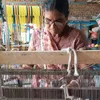Delhi-based Dristi is bringing change to villages by focusing on education and skill training
Dristi, which was started by two mechanical engineers in 2013, now runs 15 chapters. It aims to create awareness on education and gender equality, and regularly holds training sessions for adults and children.
Decades ago, Mahatma Gandhi famously said: “India is not Calcutta and Bombay; India lives in her seven hundred thousand villages.”
This holds true even today with the rural population of India pegged at over 65 percent by the World Bank in 2018.
Vikas Pandey, an engineering student, woke up to the harsh reality of the “unequal division of opportunities” in today’s world in 2012. Back home in Gorakhpur, Uttar Pradesh, on a break from college, he found the going tough during routine electricity cuts as his gadgets unfailingly ran out of charge.
Over time, as he studied at Birla Institute of Technology, Mesra, Jharkhand, and adapted to life in the city, Vikas realised that things people took for granted in urban areas were deemed luxuries in villages. He decided to bridge “this gap between the fortunate and the not-so-fortunate people”, and began work in and for the “real India” - its villages.
Today, he runs Directing Rural India Towards Social and Technological Integration (DRISTI), a foundation that aims to create awareness on education, gender sensitisation, and other socially relevant issues in villages.
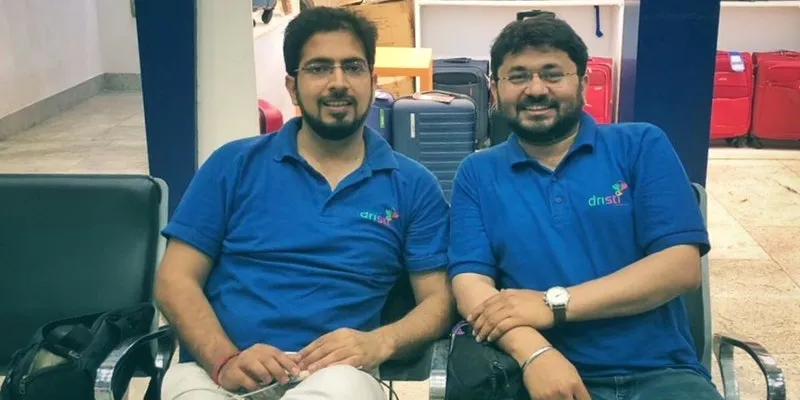
Vikas Pandey along with Shubhanshu Shekar Shukla, Founders of DRISTI
How it all started
Vikas was in his village when he remembered a dhaba outside his college, where the owner would put up a screen so students and other people could enjoy an ongoing match.
He decided to use the same idea in his village, and proposed it in his college. A team of college students ended up installing a flex screen, and using a projector and speakers to telecast a video to create awareness on education, gender equality, and social reform. This session was held in Masu, and approximately 300 villagers watched the video; many of them showed an interest in learning more.
Vikas realised that he could use this idea as a springboard to create change, and founded Dristi with his college junior turned friend, Shubhanshu Shekhar Shukla, in 2013.
Speaking to SocialStory, Shubhanshu says,
“If you create a platform where people can get together, you can solve a lot of issues. Educational videos, online learning classes…hundreds of ideas came into our mind.”
Since then, Dristi has worked across various villages, mainly in Jharkhand, and a few in Chhattisgarh and Bihar.
“Currently, we function in Mesra, Lalpur, Deoghar, Raipur, and Delhi chapters,” Vikas says.
After working for almost seven years now, Dristi claims to have impacted an average of 150 villagers in each chapter. The foundation has 4 chapters as of now, and claims to have benefited thousands of villagers. All projects are funded by the college alumni association.
Working on rural transformation
As many as 457 student volunteers are part of the team across all chapters. They work on a voluntary basis, often setting aside weekends for Dristi.
“The first thing was education. By providing education, we can essentially bridge the gap but only students could benefit, we thought. What about the other people?” Vikas says.
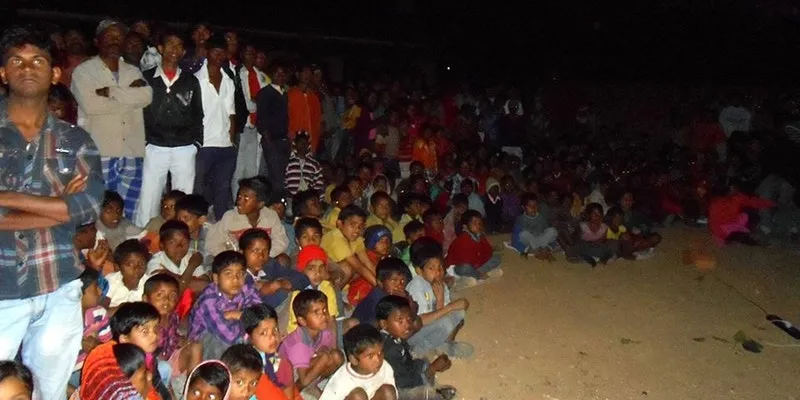
Villagers looking at the projector being set in their region
The team began by conducting surveys to know more about the villagers’ education and financial status, after which volunteers train them in skills that will make them job-ready. They provide counselling on career options, especially to individuals who have ITI, polytechnic, and vocational degrees but are not aware of opportunities.
We have provided a few with computer education and have trained others to work in garages, Vikay says
Apart from computer courses, the team is also trying to provide vocational training and set up self-help groups for women.
The villagers, in turn, have turned their focus on their children’s education and personality development. The Dristi team helps by organising classes for competitive exams and vocational courses. Till date, they have organised 500-plus sessions for children.
Helping students create change
Vikas and Shubhanshu, both mechanical engineers, realised that they needed to get young college students on ground to help bring change.
“In college, they now have a platform to go to these communities and think about solutions for them. This not only allows for better understanding, but also inculcates the spirit of fraternity,” he says.
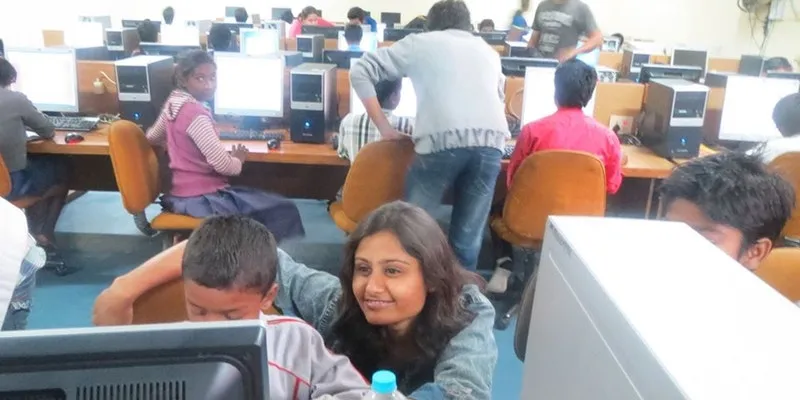
DRISTI Volunteer guiding children in computer labs
College students also often take up rural projects that can help village communities. Working in villages also helps in their personal growth.
Vikas adds, “In colleges where they have a platform to go to these communities and think about reasonable solutions for them, it allows them not only a better understanding but also, inculcates the spirit of fraternity.”
The way ahead
According to Vikas, the villagers needed convincing initially as the idea was new to them.
“Once we showed some results…that created confidence. Now, they participate enthusiastically and without fail,” Shubhanshu says.
Dristi is also working to empower women in villages. “Our women-focused cell, Damini, aims to create awareness among all on women’s capability, and their right to education, employment, freedom of speech, expression, and safety,” Shubhanshu says.
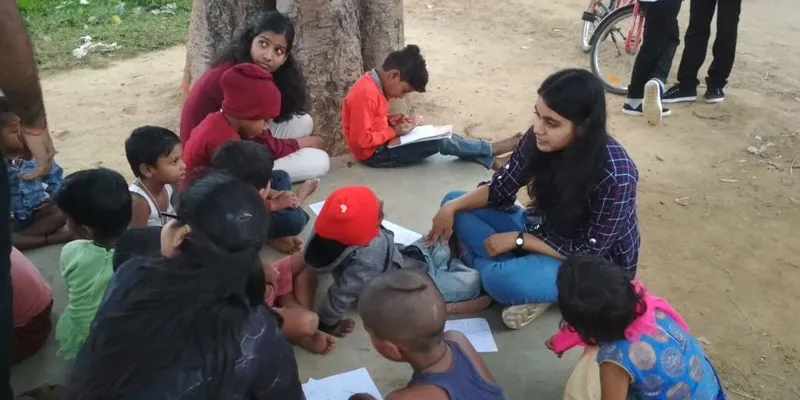
Volunteers teaching children
In the future, the founding duo plans to establish cells in residential college campuses to use specific locations for Dristi’s activities.
“For instance, a dhaba can be used to conduct evening classes, online courses, and a lot of things. Volunteers and teachers can also be a part of it,” says Vikas
(Edited by Teja Lele Desai)



